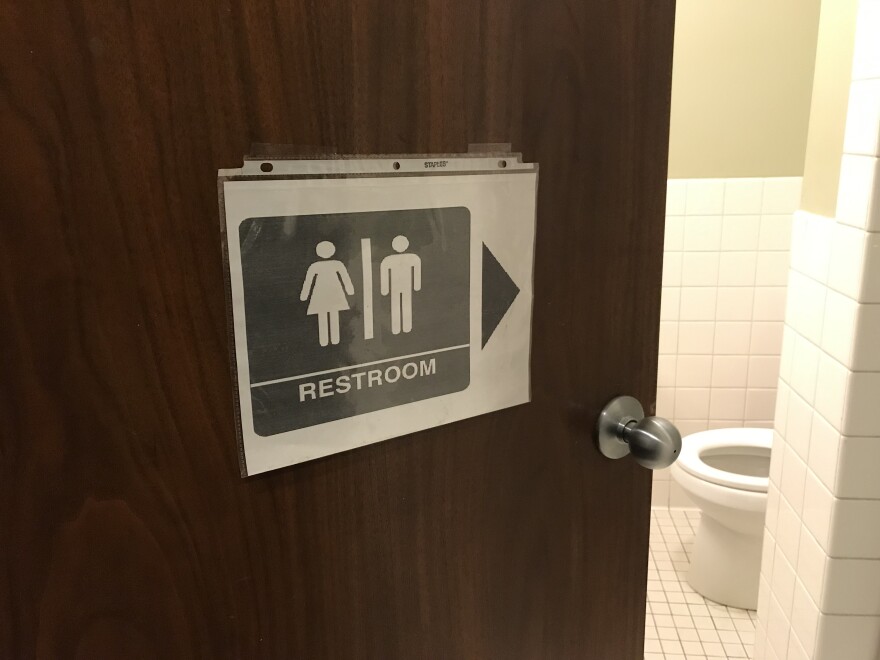Single-stall restrooms in shops and restaurants around Baltimore could become gender inclusive — that is, not specifically designated for men or women — under a bill making its way before the City Council.
"All Gender," "Gender Inclusive," "Gender Neutral" or simply "Restroom" are all signs that could appear on single stall restroom doors under the bill, which would apply to publicly- and privately-owned establishments. Washington, D.C., Philadelphia and New York City have passed similar legislation in the last several years.
Many advocates of the bill, like Alaine Jolicoeur, have called the bill both “low-hanging fruit” and a powerful piece of legislation that will help them feel safe and welcome throughout the city.
“When I need to use the restroom, I always have to be extra vigilant in my environment,” said Jolicoeur, a trans woman who teaches history at Benjamin Franklin High School and serves on the Baltimore City LGBTQ commission.
Refraining from using the bathroom when she needs to go has taken a toll on her medically, she said.
If turned into law, the bill would give trans and gender-nonconforming people "the opportunity to just have an access point to use the restroom without [others] questioning whether they should belong there, or if that's the right one for them to attend to," Jolicoeur said.
Jolicoeur moved from Florida to Maryland after the General Assembly passed the Fairness for All Marylanders Act, which forbade gender based discrimination in employment and housing, in 2014. She says she loves Baltimore, but the city can still improve its protections for trans people.
“This bill helps accomplish that,” she said. “We all deserve access. We all deserve privacy. We all deserve the same equal opportunity to use the restroom.”
Zeke Cohen, the lead sponsor of the bill, says hearing of experiences like Jolicoeur’s and of many other trans Baltimoreans are part of what led him to introduce the bill.
“I think it is critically important that we, as legislators, listen to people who have been marginalized within our city,” Cohen said, “particularly our transgender and gender nonconforming communities who have often been victims of violence.”
The bill has overwhelming support on the council from 10 co-sponsors: Brandon Scott, Sharon Green Middleton, Ryan Dorsey, Robert Stokes, Sr., Bill Henry, Kristerfer Burnett, John T. Bullock, Shannon Sneed, Edward Reisinger and Mary Pat Clarke.
The City Council unanimously passed a resolution last month in support of JBB, a policy of the Baltimore public school board that recognizes and support the needs of transgender students. JBB also inspired the bill, Cohen said.
“I wanted to make sure that in addition to this resolution asking the school board to step up, that we, the city of Baltimore, stepped up,” he said.
Cohen said he’s spoken at length with the business community about the “slight additional cost” purchasing new bathroom signs may incur.
“Overwhelmingly, business owners were supportive because they understand that when cities move toward greater gender inclusive city, that they actually attract more people,” the councilman said.
Cailey Tolle, the president of the Maryland Retailers Association president, says she believes this to be true.
“It’s simple economics,” she said. “Retailers and businesses really do want to make their customers comfortable, because that's why people frequent businesses.”
She supports most of the bill – her primary concern lies in definition of gender inclusive signage. The bill’s current language says that a restroom sign cannot indicate a specific gender, and many of her association’s members have family restroom signs or signs that depict a male and female outline.
Removing those signs would be “a little frustrating for our folks,” she said.
“We would just love to see broader language about what could be used on the sign because obviously if there's a male and a female on the sign, anybody can use that bathroom,” Tolle said.
She praised one amendment to the bill that gives non-complying businesses 30 days to comply with the law after receiving a written warning, rather than face potential fines immediately. There might be business owners who do not fully understand the bill right away “maybe because of language barriers, or... haven’t even heard of this bill,” Tolle said.
Under the bill, business owners who don’t have a gender inclusive sign could be fined as much as $500 each day of noncompliance. Inspectors from the Departments of Health, Housing and Community Development, Public Works, Recreation and Parks, Transportation, as well as the Fire and Police Departments, can serve as code enforcement officers.
Proponents of the bill say its fines are not meant to penalize businesses but serve as an enforcement mechanism.
“We understand there could be barriers to acquiring appropriate, gender inclusive signage and will continue to work with the business community during the implementation phase, assuming the bill becomes law,” Stefanie Mavronis, Cohen’s director of civic engagement, said.
Trans people won’t be the only ones who benefit if the bill becomes law, Cohen said.
Disability advocates at the bill’s hearings have said the bill may be helpful for people that are in wheelchairs or have any sort of physical disability. Cisgender women also testifying said they are tired of waiting in long lines for single-stall women’s restrooms, while men breeze through single-stalls designated for them.
The bill passed a preliminary council vote this week and could be up for a final vote as early as June 3rd – the first Monday of Pride Month.



